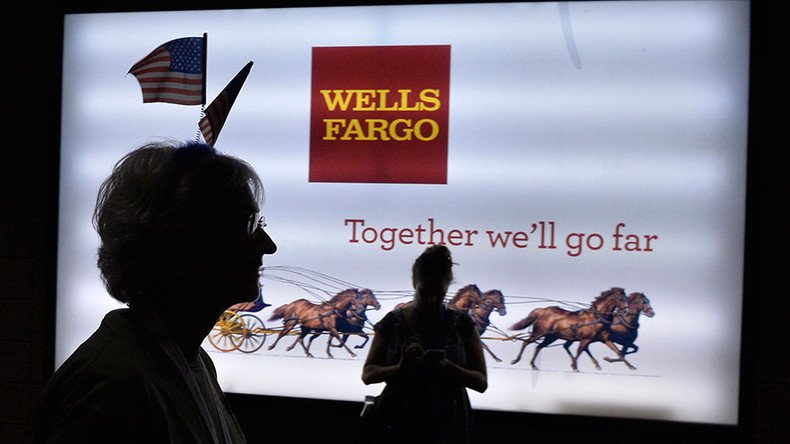Another day, another $185mn: Wells Fargo fined for opening fake accounts

A top US bank, Wells Fargo, has agreed an $185 million payout settlement with California and federal regulators after it opened more than 2 million fake accounts not authorized by customers. It is the company’s second instance of fraud in recent months.
“Wells Fargo employees secretly opened unauthorized accounts to hit sales targets and receive bonuses,” Consumer Financial Protection Bureau Director Richard Cordray said in a statement on Thursday, announcing the settlement. “Because of the severity of these violations, Wells Fargo is paying the largest penalty the CFPB has ever imposed. Today’s action should serve notice to the entire industry that financial incentive programs, if not monitored carefully, carry serious risks that can have serious legal consequences.”
Wells Fargo reaches $185 million settlement to settle secret account fraud case https://t.co/E2uNEms7Jr (Source:https://t.co/lSswUpU2hc)
— Stuart B. Wolfe (@LenderDefender) September 8, 2016
The state of California and federal regulators filed a complaint in May 2015, accusing Wells Fargo of opening more than 2 million deposit and credit card accounts that may not have been authorized by customers. Money in customers’ accounts was transferred to the new accounts without authorization. Debit cards were issued and activated, as well as PINS created, without telling customers, according to the CFPB.
In some cases, Wells Fargo employees even created fake email addresses to sign up customers for online banking services.
"Wells Fargo built an incentive-compensation program that made it possible for its employees to pursue underhanded sales practices, and it appears that the bank did not monitor the program carefully," said Cordray.
Wow tell me this isn't Fraud or Theft?
— Ronnie Wilson (@cerr98) September 8, 2016
https://t.co/E0MTCJ7JLY via @markets
The CFPB and other regulators found the behavior was widespread, and involved thousands of Wells Fargo employees.
The San Francisco-based bank will pay $100 million to the CFPB, a federal agency created five years ago as part of government reform of banking corruption; $35 million to the Office of the Comptroller of the Currency; and $50 million to the City and County of Los Angeles. It will also pay restitution to the affected customers.
The bank's aggressive tactics were first disclosed by a Los Angeles Times investigation in 2013, leading the attorney general to file the complaint two years later. Despite the investigation and subsequent lawsuit, Wells Fargo is still known for having aggressive sales goals for its employees. Every quarter, the bank highlights its “cross sale ratio,” which is the number of products the bank sells to each customer.
“The ratio hovers around six, which means every customer of Wells Fargo has on average six different types of products with the bank,” AP reported.
Fined over fees: #WellsFargo to pay $4.1mn for illegal student loanshttps://t.co/VJUT6q9mZlpic.twitter.com/6AZ7TKAVkw
— RT America (@RT_America) August 23, 2016
The Los Angeles City Attorney’s office said more than 5,000 bank employees were fired because of the fraud.
In a statement, Wells Fargo said: "We regret and take responsibility for any instances where customers may have received a product that they did not request."
In late August, the company was fined $4.1 million to settle a separate case by federal regulators that it had charged students illegal fees and failed to update inaccurate credit report information.
“Specifically, if a borrower made a payment that was not enough to cover the total amount due for all loans in an account, the bank divided that payment across the loans in a way that maximized late fees rather than satisfying payments for some of the loans,” the watchdog said in a statement about that settlement.
Wells Fargo has weathered multiple charges of fraud, many of which it has agreed to settle, including money laundering for narcotics traffickers.
Another for-profit college in trouble: ITT Tech sanctioned by government https://t.co/YbXsMFbF1Tpic.twitter.com/d4b5TateTP
— RT America (@RT_America) August 26, 2016
The bank was accused of steering African Americans and Latinos into high-cost subprime loans, and settled with the Justice Department for $175 million in 2012.
It was sued for charging excessive overdraft fees on checking account customers; the bank settled by paying $203 million in 2013.
The bank was also sued for defrauding the Federal Housing Administration by underwriting 100,000 FHA-backed loans when half the applicants didn’t qualify for the program.












